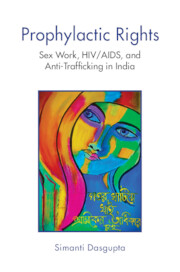Book contents
- Frontmatter
- Dedication
- Contents
- List of Figures
- Acknowledgements
- Introduction: The Karmi (Worker)—From Pesha (Prostitution) to Kaaj (Sex Work)
- 1 The Laboring Gatar: The Body between Suffering and Risk
- 2 Condom-wallis (Condom Sellers) and Condom Narratives
- 3 The Politics of Victimhood: Pachar and Trafficking
- 4 Mela, Immobility, and Imperial Feminism
- Epilogue: Another Virus, Another Lockdown
- Bibliography
- Index
2 - Condom-wallis (Condom Sellers) and Condom Narratives
Published online by Cambridge University Press: 31 May 2024
- Frontmatter
- Dedication
- Contents
- List of Figures
- Acknowledgements
- Introduction: The Karmi (Worker)—From Pesha (Prostitution) to Kaaj (Sex Work)
- 1 The Laboring Gatar: The Body between Suffering and Risk
- 2 Condom-wallis (Condom Sellers) and Condom Narratives
- 3 The Politics of Victimhood: Pachar and Trafficking
- 4 Mela, Immobility, and Imperial Feminism
- Epilogue: Another Virus, Another Lockdown
- Bibliography
- Index
Summary
It's our responsibility to prevent society to get infected with diseases. We are doing this since more than 2 decades. We are not only Sex Worker but Health Worker too. We are happily living with various identity like Mother, wife, worker, victim, leader and moreover as WOMAN.
—All India Network of Sex Workers (AINSW), August 26, 2019Kalpana-di came upstairs at Abinaash and settled down with her lunch on the madur (straw mat) spread on the floor. Unlike other days when she would animatedly describe her encounters in the field, she looked dejected. She opened her tiffin box and started eating rather distractedly. This aberration did not escape us, and we wanted to know what was bothering her. Kalpana-di sadly recounted that her long-time friend, Bina-di, who had been ill for some time now, was now “very sick; I don't think she will live much longer.” Deferring to the custom of secrecy, particularly with respect to a close friend's HIV+ status in order to avoid stigma and even shame, Kalpana-di was careful to convey Bina-di's diagnosis as abstrusely as possible. An HIV+ diagnosis in Sonagachi is shrouded in euphemisms and is routinely coded as “very sick,” “very weak,” “cannot eat,” “lost so much weight,” and so on, coupled with a premonition of death. However, everybody present that afternoon knew that I had recently taken Bina-di to the ART Center at the Calcutta School of Tropical Medicine (Tropical), and was most likely aware of her diagnosis, so nobody asked me any questions either.
Based on the doctor's evaluation, Bina-di had advanced stage tuberculosis. Furthermore, her lack of access to nutritional food and her insalubrious living conditions would severely impede her recovery. I had known Bina-di for a few years. She was an older woman and had worked in Sonagachi for close to 20 years. However, due to advancing age and other ailments, she had retired a few years ago. Though Bina-di predated the 1990s categorization, she would then be considered B-category. Like many other B-category sex workers, neither was she able to save enough for a secure retirement nor was she able to invest in real estate to become a malkin. Often, she was cash-strapped and struggled to pay rent and procure food.
- Type
- Chapter
- Information
- Prophylactic RightsSex Work, HIV/AIDS, and Anti-Trafficking in India, pp. 110 - 146Publisher: Cambridge University PressPrint publication year: 2024

